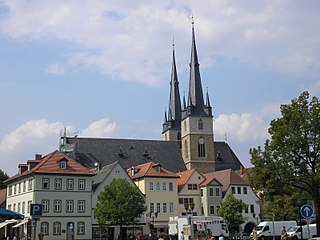| Look up Altenburg in Wiktionary, the free dictionary. |
Altenburg is a town in Thuringia, Germany.
Contents
Altenburg may also refer to:
| Look up Altenburg in Wiktionary, the free dictionary. |
Altenburg is a town in Thuringia, Germany.
Altenburg may also refer to:
Altenburg is the German exonym for the towns of:
Altenberg may refer to:

Thuringia, officially the Free State of Thuringia, is a state of Germany. Located in central Germany, it covers 16,171 square kilometres (6,244 sq mi), being the sixth smallest of the sixteen German States. It has a population of about 2.1 million.
Berg may refer to:

The states of the German Confederation were member states of the German Confederation lasted from 20 June 1815 until 24 August 1866.

The House of Wettin is a dynasty of German counts, dukes, prince-electors and kings that once ruled territories in the present-day German states of Saxony, Saxony-Anhalt and Thuringia. The dynasty is one of the oldest in Europe, and its origins can be traced back to the town of Wettin, Saxony-Anhalt. The Wettins gradually rose to power within the Holy Roman Empire. Members of the family became the rulers of several medieval states, starting with the Saxon Eastern March in 1030. Other states they gained were Meissen in 1089, Thuringia in 1263, and Saxony in 1423. These areas cover large parts of Central Germany as a cultural area of Germany.
Falkenstein or Falckenstein may refer to:
Schönberg may refer to:

Saalfeld is a town in Germany, capital of the Saalfeld-Rudolstadt district of Thuringia. It is best known internationally as the ancestral seat of the Saxe-Coburg and Gotha branch of the Saxon House of Wettin, which was renamed the House of Windsor during their British reign in 1917.
Reichenbach may refer to:
Wolfsberg may refer to:
Schwarzenberg may refer to:
Eisenberg is a German name in geography and a surname. Literally translated it means ″iron mountain″. Eisenberg may refer to:

Reinhardsbrunn in Friedrichroda near Gotha, in the German state of Thuringia, is the site of a formerly prominent Benedictine abbey, the house monastery of the Ludovingian Landgraves of Thuringia abbey extant between 1085 and 1525. Later used as an administrative seat by the Ernestine dukes of Saxony, the premises were turned into a castle and park erected by the Dukes of Saxe-Coburg and Gotha from 1827.
Schönau may refer to:
Heiligenberg is a municipality and a village in the Bodensee district, Baden-Württemberg, Germany.
Schwarzbach is a German name meaning "dark stream."

The coat of arms German state Thuringia was introduced in 1990. Like the 1949 coat of arms of Hesse it is based on the Ludovingian lion barry, also known as the "lion of Hesse", with the addition of eight mullets.

The Division of Altenburg was the plan for the division of the Meissen lands agreed upon by the two hostile Wettin brothers Elector Frederick II of Saxony and William III on 16 July 1445 at Altenburg. The brothers had attempted to reconcile, but eventually the division led the Saxon Fratricidal War, which began in 1446 and lasted for five years, until the Peace of Naumburg was negotiated in 1451. Following the peace, the subsequent Treaty of Eger in 1459, and the deaths of Frederick II and William III, the two sons of Frederick II eventually gained control of the land of both their father and William III.

The Thuringian states refers to the following German federal states within the German Reich:
Altenstein may refer to: